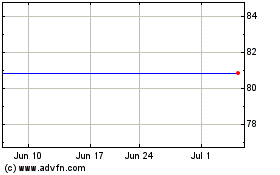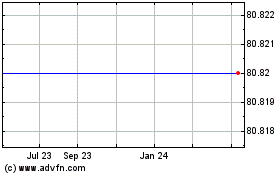St. Jude Medical Announces ICD Software Upgrade Notification to Physician Customers
June 20 2005 - 6:07PM
Business Wire
St. Jude Medical, Inc. (NYSE:STJ) announced today that it has
notified physicians that certain of its implantable cardioverter
defibrillators (ICDs) are in need of a non-invasive, 45-second
software upgrade to correct two anomalies found during routine
product evaluation. The anomalies do not pose a significant risk to
patients and the Company has not received any reports of patient
adverse events or clinical complications as a result of the
anomalies. In addition to notifying its customers, St. Jude Medical
is today providing physicians with a simple software tool to
correct the issues via its programmer. The Company, in consultation
with a group of consulting physicians, has recommended that this be
done at the patient's next routine follow-up visit or at the
physician's discretion. The two issues are described below: The
Company discovered during examination of a single returned device
that it could be possible when a device's battery voltage is past
mid-life and approaching its Elective Replacement Indicator (ERI),
for a charging cycle to be skipped as the device attempts to
deliver multiple shocks in rapid succession. If this were to occur,
the first shock would always be delivered by the device as
programmed. A subsequent shock in the sequence could be delivered
after a two to four second delay, but the anomaly could cause the
device to have fewer than the maximum total of six therapeutic
shocks available for a single diagnosed episode as called for in
the product's labeling. There have been no reports of any patient
adverse events or clinical complications. The second anomaly in
some devices is an electrical "noise" generated as a result of the
charging of the device's high-voltage capacitors (tracked back to a
component supplied by one vendor). The "noise" in the capacitor can
be interpreted by the device's sensors as activity if programmed
on, causing a temporary increase in the pacing rate. Again, each of
the devices has a safe maximum pacing rate set by the patient's
physician, and the Company has not received any reports of patient
adverse events or clinical complications. "As a member of St. Jude
Medical's advisory group reviewing these issues, I am confident
that the Company has taken the appropriate proactive steps in
resolving the anomalies in the best interest of patients," said Dr.
Bruce Wilkoff, director of cardiac pacing and tachyarrhythmia
devices at The Cleveland Clinic Heart Center. There are
approximately 39,000 Epic(TM) and Atlas(R) devices implanted
worldwide that are subject to one or the other software upgrade.
St. Jude Medical has worked actively with the U.S. Food and Drug
Administration (FDA) in approving the software upgrade and in
developing an implementation plan, in consultation with a physician
advisory panel, to proactively issue the voluntary notification.
The software upgrade was approved by the FDA on Friday, June 17,
and has already been sent to physician customers. The Company does
not expect this advisory to have any material financial impact.
Note to editors: A programmer is a special tabletop computer that
enables a physician to communicate non-invasively with a patient's
implanted device. A telemetry wand is placed on the patient's chest
and the programmer will automatically detect the affected ICDs and
download the new software to the device. This process should take
about 45 seconds. St. Jude Medical, Inc. (www.sjm.com) is dedicated
to the design, manufacture and distribution of innovative medical
devices of the highest quality, offering physicians, patients and
payers outstanding clinical performance and demonstrated economic
value. Any statements made regarding the Company's anticipated
future product launches, regulatory approvals, revenues, earnings,
market shares, and potential clinical success are forward-looking
statements which are subject to risks and uncertainties, such as
those described in the Financial Section of the Company's Annual
Report to Shareholders for the fiscal year ended December 31, 2004
(see page 16). Actual results may differ materially from
anticipated results.
SJM (NYSE:STJ)
Historical Stock Chart
From Sep 2024 to Oct 2024

SJM (NYSE:STJ)
Historical Stock Chart
From Oct 2023 to Oct 2024
